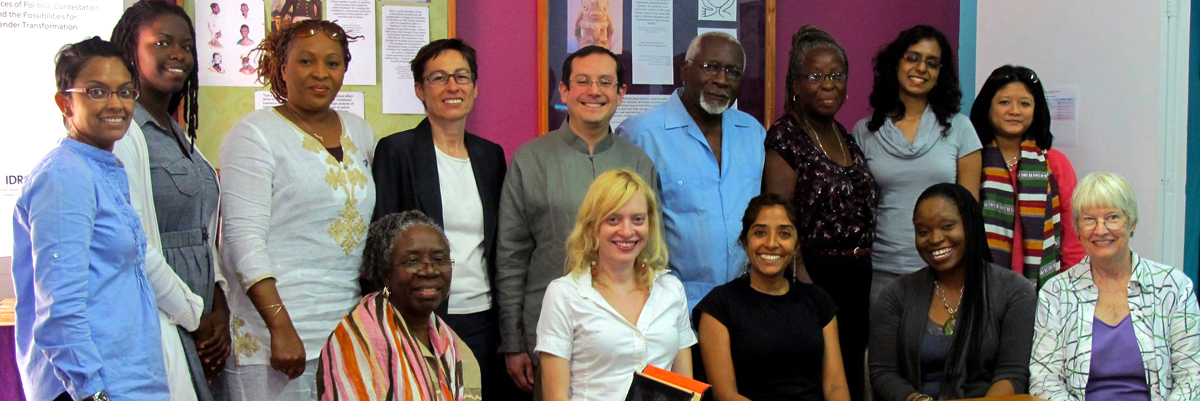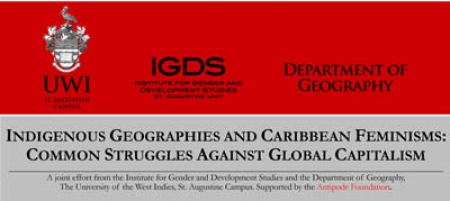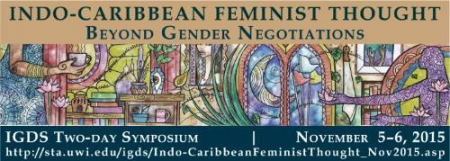Conferences and Symposia
2018
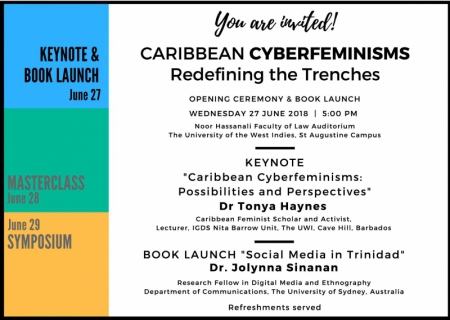
June 27–29., 2018 Facebook event
Caribbean Cyberfeminisms: Redefining the Trenches Master Class and Symposium,
Cyberspace and social media offer a range of opportunities for feminist consciousness-raising and movement-building to advance gender justice and gender equity. Social media reach, speed, accessibility, momentum, cost-effectiveness, variability, adaptability, and creativity enhance the impact of outreach and activism. In June 2018, the IGDS brought together Caribbean cyberfeminists for an unprecedented opportunity to build and evaluate the capacity and impact of online feminist consciousness-raising and movement-building.
2013
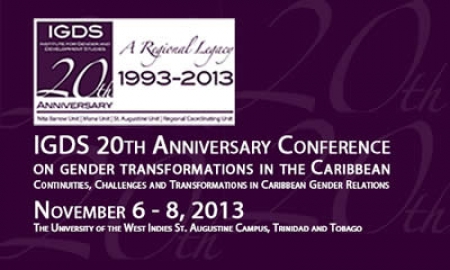
20th Anniversary Conference on Gender Transformations in the Caribbean in recognition of Prof. the Hon. Barbara Bailey "Continuities, Challenges and Transformations in Caribbean Gender Relations" November 2013 Website
2011
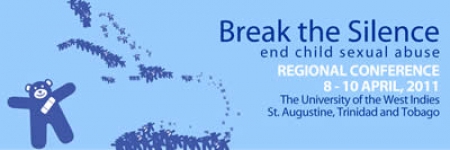
Break the Silence: Understanding and Preventing Child Sexual Abuse and HIV Risk
Presentation of Research Findings and an Intervention Model
April 2011 | Website
A primary component of this conference is the presentation of the project community intervention model and its rigorous analysis. In addition, the conference will facilitate the emergence of recommended policy changes, new strategies, protocols and further interventions related to CSA/Incest and implications for HIV transmission.
The objectives of the conference are:
- To provide opportunities for dialogue among stakeholders to develop innovative solutions to addressing the challenges in research and implementation of policies and programmes related to Child Sexual Abuse (CSA) / Incest and HIV risk;
- To share research findings of the action research project: Breaking the Silence (BTS): A Multisectoral Approach to Preventing and Addressing CSA / Incest and Implications for HIV in Trinidad and Tobago with local and regional stakeholders, and to gain feedback on how to enhance / revise policies and procedures related to CSA / Incest and HIV, in keeping with international human rights standards;
- To share with local and regional stakeholders an intervention model aimed at preventing CSA and associated HIV risk;
- To increase public awareness of CSA / Incest and implications for HIV, and influence leaders, including key policy makers and donors / partners, to increase their commitment to gender sensitive, evidence and human rights based interventions that prevent and address CSA / Incest and HIV.
2011

New Geographies: Studies in Postcoloniality and Globalization
March 2011 Website
Locating postcolonial studies within the 21st century means situating it within the globalising world, and by doing so to shift anew the configurations within which we can engage the contemporary with the so called ‘post’. There has been an outpour of writing both celebrating, on the one hand, ‘postcolonial theory’s and studies’ attempts to subvert, interrogate and challenge the established structure of western Eurocentric thought and on the other, to denounce ‘postcolonial studies’ as a sort of spurious attempt to do just that. Part of the reason for the denouncement lies in the question of how to locate the ‘post’ of ‘postcolonial’. The argument forwarded has often been that the term ‘postcolonial’ itself, which as scholars have previously pointed out, indicates a linear conception of time, whilst others have argued that ‘postcolonial’ need not necessarily indicate a temporal linearity but an attempt to go beyond established parameters and structures of colonialism. Hence the ‘post’ like in postmodernism, post-structuralism and so on. Within this framework several questions arise: the question of where are we headed to? If, or not, postcolonialism has ended? Where to locate it? And more importantly, how to locate it within the 21st century? These are just some of the questions that are informed by the curious ways in which we understand the word ‘post’. But however we choose to understand the term, are we still caught in the very structures of Eurocentric, western thought paradigms that postcolonialism claims to and tries to subvert: whether those thought paradigms have to do with history and re-telling history, or the discourse on the so called ‘other’, or on the much articulated terms of hybridist, multiculturalism and difference. Is there a way out? Or is the way out yet another trap door which you exit only to return to the same point of entry? Perhaps, it is the unique situation of the 21st century globalised world that will provide us with the tools to push postcolonial studies beyond rather than simply announcing its premature demise.



